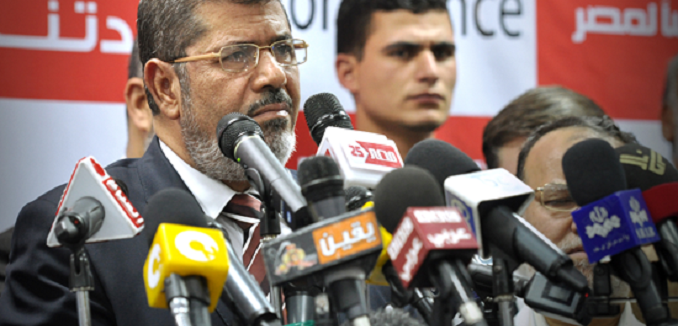Egyptians will go to the polls this weekend to vote on a new draft constitution, controversy over which has triggered violence throughout Egypt and raised concerns about Cairo’s uneven transition to democracy. Decisions by Egyptian President Mohammed Morsi and rulings by Egyptian courts have deepened fears that the post-Arab Spring Egyptian government will curtail civil liberties and institutionalize persecution of religious minorities.
Egypt was thrown into a political legitimacy crisis by a November 22 Presidential decree under which Morsi gave himself sweeping powers and denied Egyptian courts oversight over his actions. Neither the subsequent reversal of the controversial power grab nor a hastily passed constitutional draft subject to public referendum succeeded in quelling popular anger.
The draft, which was approved almost a month ago in a marathon session by Egypt’s Islamist-dominated constitutional assembly, has been criticized for emphasizing Islamic law and failing to adequately protect the rights of women, religious minorities, and others. Voting in the national referendum to approve the new constitution will take place this Saturday and next Saturday. Cairo extended the voting period due to a shortage in judges available to oversee ballot casting, after many Egyptian judges went on strike in response to attempts by Islamist supporters of Morsi to intimidate Egypt’s courts in their institutional battle against the Muslim Brotherhood-linked President.
Demonstrations in support and in opposition have claimed eight lives and left hundreds injured in recent weeks. Clashes continue to break out on the eve of voting, with violent protests erupting on Friday in Alexandria. In an effort to enforce calm Egyptian President Mohammed Morsi had charged the Egyptian military with maintaining order, and granted soldiers the power to arrest protesters. General Abdel Fattah al-Sissi earlier this week called for unity talks between opposing camps.
Morsi’s power grab and deployment of the military immediately gave rise to speculation that rather than putting Egypt on the road to democracy, the Arab Spring had merely succeeded in replacing a relatively secular autocracy with an openly Islamist autocracy. The analysis was reinforced mid-week when privately owned Egyptian newspaper Al-Masry Al-Youm published reports exposing what the paper described as a network of torture chambers used by the Muslim Brotherhood to punish Morsi’s opponents and critics.
Also earlier this week, an Egyptian court sentenced a 27-year-old Copt, computer science graduate Alber Saber, to three years in prison for insulting Islam. Saber’s trial and conviction revolved around accusations that he uploaded sections of the anti-Mohamed film “Innocence of Muslims” to the Internet. Critics are citing the ruling as further evidence that Egypt’s Muslim Brotherhood-dominated government is failing to protect religious minorities.
[Photo: Jonathan Rashad / Wiki Commons]




